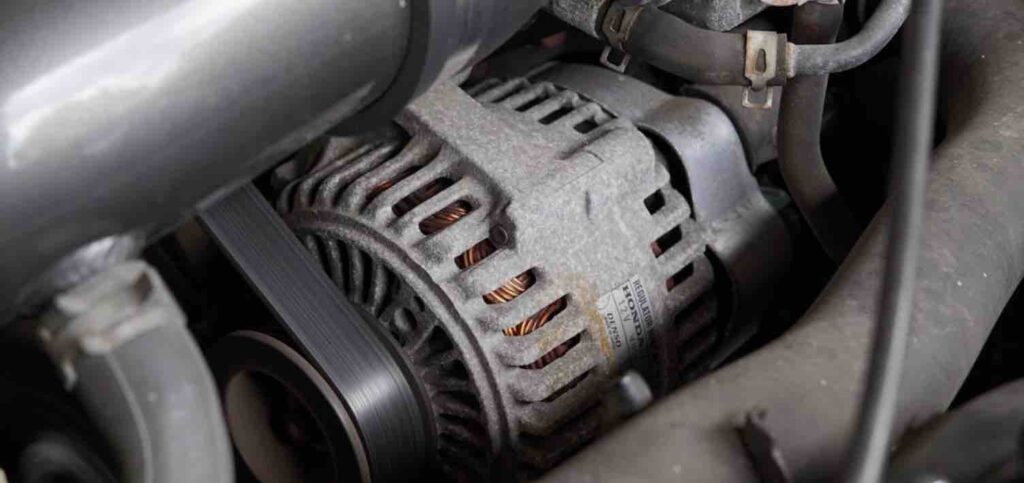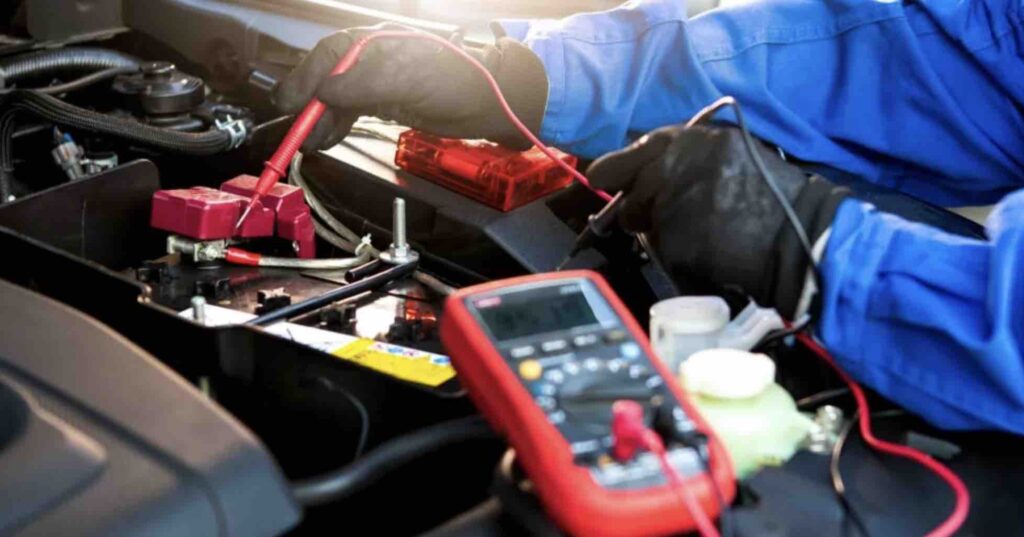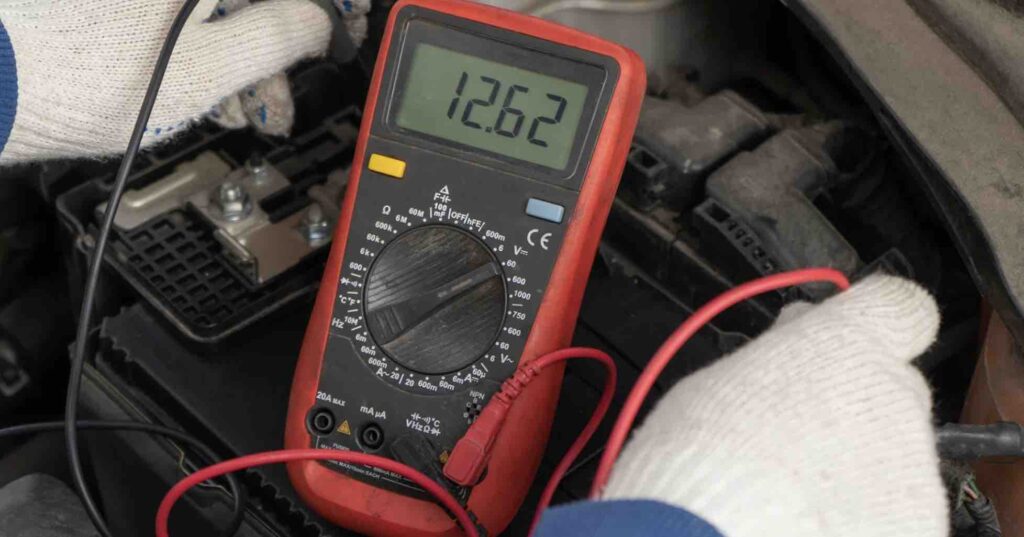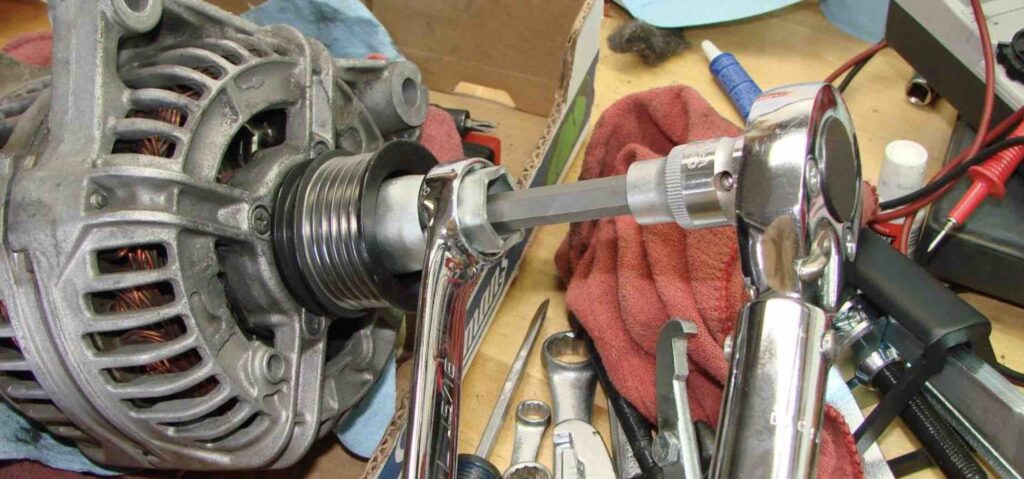Last updated on July 12th, 2023 at 09:40 am
what Does An Alternator Do, how to troubleshoot an alternator not charging battery symptoms, and how to fix the alternator not charging battery but alternator is good, and Well, an alternator is an integral part of a vehicle’s electrical system, responsible for producing electricity to charge the battery and supply energy to various electrical components.
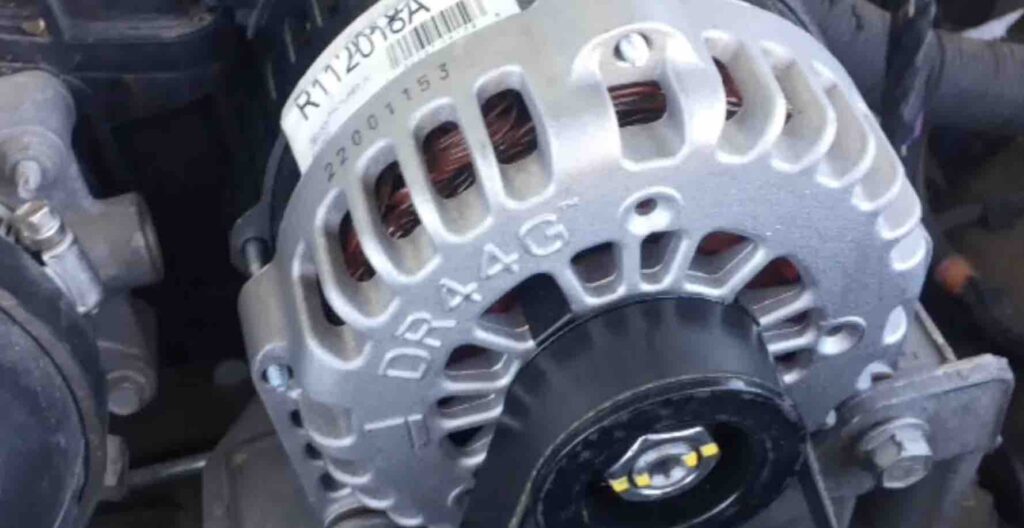
As the engine runs, this energy converts mechanical work into the electrical drive through electromagnetic induction. This electrical charge then recharges the battery so it remains charged and ready to start up the engine as well as power other essential vehicle features like headlights, wipers, entertainment system, etc.
In this are article we will be discussing the following subtopics:
- why is alternator not charging battery but alternator is good and the causes of alternator not charging no battery light
- The alternator not charging until revved problem troubleshooting, a good alternator good battery not charging and alternator not charging battery symptoms
- 3 wire alternator not charging issue and alternator not charging battery at idle fix
The Importance of a fully functional Alternator
Maintaining your alternator is essential for optimal performance, and one way to keep it this way is by regularly checking its voltage output and maintaining a regular routine check.
If the alternator is not effectively charging the battery, it will cause various issues like difficulty in starting your car engine, dimmed headlights, or even a complete loss of power while driving and make your car stop at any time.
An inadequate charging system leads to decreased fuel efficiency and premature wear on other vehicle parts. Therefore, regular inspection and maintenance of your car’s alternator are necessary in order to guarantee optimal performance and avoid expensive repairs or inconvenient breakdowns.
why is alternator not charging battery but alternator is good?
Even when your alternator looks perfect, you may still experience intermittent charging issues. Here’s why this could be happening:
Even if it appears to be functioning normally, an alternator may still fail to charge your battery. Determining what’s causing this issue and fixing the root cause are essential steps for restoring proper charging system operation.
Causes of alternator not charging no battery light
1. Faulty wiring or connections
One of the primary causes of alternator charging problems is faulty wiring or connections within the system. Corrosion, damaged wires, or loose connections can all prevent your alternator from effectively delivering electrical energy to your battery. Inspecting and repairing any damaged or corroded wiring and ensuring all connections are secure can help solve charging problems.
2. Damaged Voltage Regulator
The voltage regulator is responsible for monitoring the output voltage produced by an alternator to guarantee it stays within the ideal range for charging batteries. (AA1Car, 2021) A damaged or malfunctioning voltage regulator can prevent charging even if the alternator itself remains working fine. In some cases, replacing just the voltage regulator will suffice; in others, replacement of both may be necessary.
3. Blown Fuses
When a fuse within the charging system has blown, it may prevent the alternator from charging the battery. Fuses are meant to protect vehicles’ electrical systems by breaking the circuit when excessive current is detected. Therefore, it’s essential to identify and address the root cause of this excess current before replacing the fuse; simply replacing it without addressing its cause could result in further harm.
4. Poor Battery Condition
A battery in poor condition can contribute to alternator charging issues. If it is unable to hold a charge, the alternator may struggle to maintain proper voltage levels – leading it to appear as though it isn’t charging at all. Regular inspection and maintenance of your battery, including cleaning terminals and inspecting for signs of damage, helps guarantee it remains working optimally and does not cause any further issues with charging system functionality. (Motor.com, 2005)
See also: Can You Jumpstart A Car With A Bad Alternator?
how to know if it is the Bad Alternator or Bad Battery
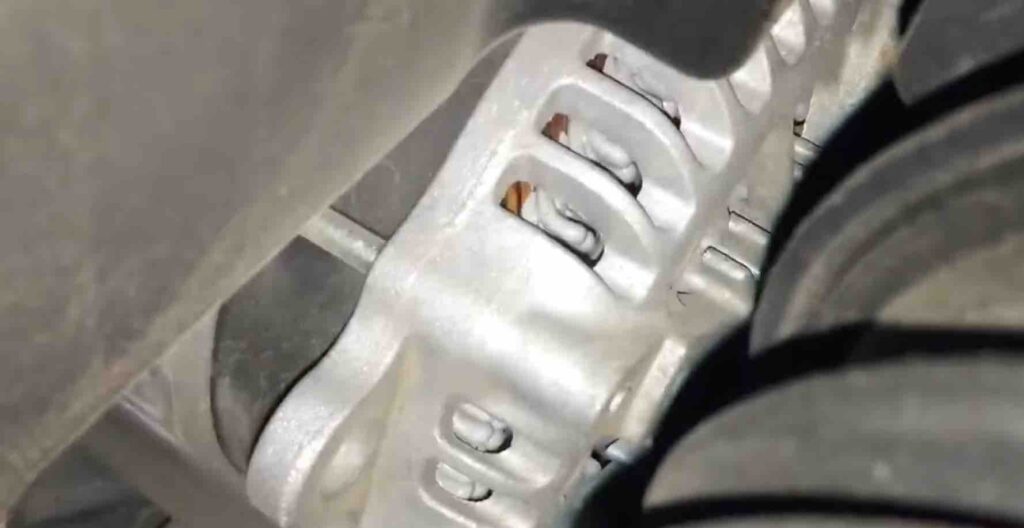
alternator not charging battery but alternator is good
So if the alternator of your car is not charging the battery, but you think or know that the alternator is good, then here what most likely reasons for it.
Simple this kind of issue could be due to various underlying issues that are not directly related to the alternator itself; for instance, factors like a malfunctioning voltage regulator, wiring issues, or a weak or bad battery could all create a situation in which even though the alternator appears healthy, it still fails to charge appropriately.
This could how to all types of alternators including the 3 wire alternator not charging and the rest.
How do you get a bad alternator to work?
Diagnosing and Fixing the Issue
To diagnose the problem quickly, fix an alternator not charging battery but the alternator is good, simply follow these steps.
- When your alternator appears to be functioning normally, follow these steps to diagnose and resolve a charging problem:
- Examine the wiring: Check for signs of corrosion, damage, or loose connections on the wiring connections between the alternator, battery, and voltage regulator. Repair or replace any problematic wiring (It Still Runs, 2017).
- Verify the voltage regulator: Check the voltage regulator, which controls the output voltage of an alternator, to make sure it functions properly. If found to be malfunctioning, replace either just the voltage regulator or all of your alternators if needed.
- Test the battery: Verify its condition by testing its capacity to hold a charge. If it appears that your battery may be malfunctioning or near the end of its lifespan, consider replacing it.
- Examine the Fuses: Inspect the fuses related to your charging system and replace any that have blown (CarsDirect, 2012). Be sure to identify and address the root cause of the blown a fuse in order to avoid further issues.
Causes of alternator not charging with no battery light
Neglecting to operate the battery light
In some cases, the alternator may not be charging the battery, and the battery light on your dashboard fails to illuminate. This could occur due to either a problem with the actual light itself or wiring/sensor issues (2CarPros, 2018). Addressing this problem quickly is essential since it could keep you unaware of an ineffective charging system.
Charge system issues
If the alternator isn’t charging and there’s no battery light, it could indicate an issue with the charging system itself. This could include issues with the alternator, voltage regulator, wiring, or battery; thus, it’s essential to thoroughly inspect and diagnose this system in order to identify and address the issue.
Troubleshooting Strategies and Solutions
Troubleshooting is essential when issues arise in any system or software, providing guidance for troubleshooting problems as they arise, providing solutions where applicable, and saving time when possible.
Test the Battery Light:
Make sure your battery light is functioning properly by checking its illumination when the ignition is turned on, but the engine isn’t running (2CarPros, 2018). If the light doesn’t illuminate, you may need to replace the bulb or address any wiring issues associated with it.
Examine the Charging System:
Perform a detailed inspection of the alternator, voltage regulator, wiring, battery, and fuses to identify any problems within your charging system.
Seek Professional Help:
If the issue persists after performing the above troubleshooting steps, it’s recommended to seek professional assistance from a mechanic to diagnose and resolve it.
Alternator not charging until revved
Potential Causes of the Issue
If an alternator does not start charging the battery until after the engine revving, this could indicate a problem with either its internal workings or other elements in the charging system. Some potential causes could include:
- Worn alternator brushes: With age, the brushes within an alternator may wear down, resulting in poor contact and reduced charging efficiency at lower engine speeds.
- Loose or Worn Belts: A loose or worn alternator belt may not provide sufficient tension to ensure the alternator operates efficiently at low engine speeds.
- Weak or Failing Voltage Regulator: When the voltage regulator fails, it may not properly control the alternator’s output voltage at low engine speeds, leading to inadequate battery charging.
Diagnosing and Fixing the Issue
Diagnose the issue at hand to get to the root cause and find a resolution.
To diagnose and fix an alternator that only charges when the engine is revved, try these steps:
- Check the alternator brushes: Inspect the alternator brushes for wear and replace them if necessary
- Check the belt tension and condition: Inspect the alternator belt for signs of wear, and verify that it has proper tension. Adjust as necessary or replace the belt if necessary.
- Test the voltage regulator: Verify the voltage regulator is functioning properly at various engine speeds. Replace either the voltage regulator or the entire alternator if necessary.
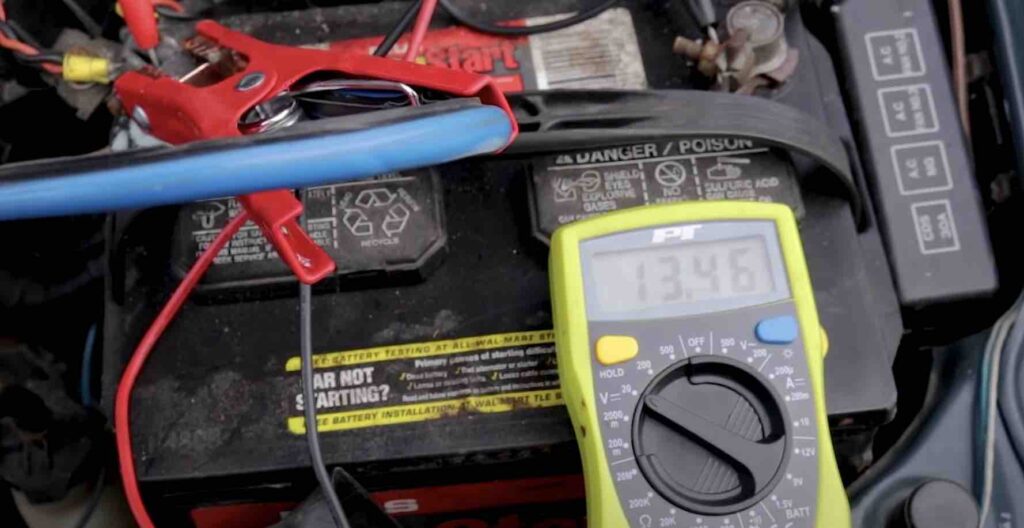
AC alternator and battery not charging
1. Potential Causes
When both the alternator and battery appear to be working fine, but the battery is not charging, there could be an underlying problem with other elements of the charging system. Potential causes could include:
- Faulty wiring or connections: Damaged or corroded wiring, as well as loose connections, may prevent proper electrical flow between the alternator and battery.
- Blown Fuses: When a fuse in the charging system blows, it interrupts electricity between the alternator and battery.
- Malfunctioning sensors or relays: Faulty sensors or relays may impede the charging system’s capacity to regulate voltage and charge batteries accurately.
2. Troubleshooting Steps and Solutions
If your alternator and battery are not charging properly, try these steps to try to troubleshoot and resolve the problem:
- Examine the wiring and connections: Inspect the wiring between the alternator, battery, and voltage regulator for signs of damage or corrosion and guarantee all connections are secure.
- Check the Fuse: Check all fuses associated with the charging system and replace any that have blown. Be sure to address the root cause of the blown a fuse in order to avoid future problems.
- Test sensors and relays: Conduct a test of the sensors and relays associated with the charging system to confirm they are functioning correctly. Replace any defective components as necessary.
- Consult a Professional: If the problem persists after performing these troubleshooting steps, seek the assistance of an experienced mechanic to diagnose and resolve it.
3 Wire Alternator Not Charging
Do your 3 wire alternators appear to be charging properly?
An explanation of a 3-wire alternator
A 3-wire alternator is a type of charging system commonly found in older vehicles. The three wires include the battery positive wire (B+), voltage sensing wire (usually connected to either the battery or key-on power source), and field or excitation wire (connected to ignition or warning light) The voltage sensing wire allows the voltage regulator to monitor the system voltage and adjust output accordingly, while this excitation wire provides initial energy for activating the alternator.
Common Issues and How to Correct Them
1. Damaged or Corroded Wiring:
Check the three wires for signs of damage, corrosion, or loose connections. Repair or replace as necessary.
2. Faulty Voltage Regulator:
Check the voltage regulator’s functionality, as a malfunctioning regulator can prevent your alternator from charging correctly. You may either replace the regulator or the entire alternator if necessary.
3. Field or Excitation Wire Issues:
Make sure the field or excitation wire is connected to a reliable power source and is secure. Repair or replace it if necessary (Hot Rod Network, 2017).
Alternator Not Charging Battery at Idle
If your alternator isn’t charging the battery when idle, there could be several reasons for this Let’s look a why the alternator not charging battery at idle first, and then we will look at Troubleshooting Steps and Solutions for an alternator that is not charging the battery at idle:
1. Potential Causes of the Problem
- Low Alternator Output at Idle: Some alternators may not produce sufficient output when engines run at low engine speeds, leading to insufficient battery charging.
- Worn alternator brushes: As previously discussed, worn brushes within an alternator can lead to poor contact and reduced charging efficiency at lower engine speeds.
- Loose or Worn Belts: If the alternator belt is loose or worn, it may need more tension for it to function optimally at idle.
2. Troubleshooting Steps and Solutions
Troubleshooting can be overwhelming at times; however, these steps can provide guidance toward finding solutions and providing a resolution.
- Testing the alternator output: At idle, measure the alternator’s output voltage to ensure it falls within its manufacturer’s specified range. Replace the alternator if its performance falls short.
- Examine the Alternator Brushes: As previously noted, inspect the alternator brushes for signs of wear and replace them if necessary.
- Check the belt tension and condition: Inspect the alternator belt for wear and proper tension, then adjust or replace it if necessary.
- Consult a professional: If the issue persists after performing the troubleshooting steps mentioned above, it is advisable to seek the assistance of a professional mechanic to diagnose and resolve the problem.
Mechanics have the necessary tools and expertise to accurately identify the cause and implement the appropriate solution so the problem stops coming bad.
Alternator Not Charging Battery Symptoms
Signs of a failing alternator
Some signs that your alternator or charging system may be malfunctioning include:
- Warning Light: On some cars, a battery or alternator warning light may illuminate the dashboard.
- Dimming or flickering headlights: Headlights may appear dimmed or flickered, particularly at low engine speeds.
- A weak or dead battery: If your battery appears to be consistently weak or dead, this could indicate a charging issue.
- Slow or Unresponsive Accessory Performance: Electrical accessories such as power windows or the radio may work slowly or stop functioning altogether
- Unusual Noises: A failing alternator may emit a growling or whining sound due to worn bearings or other internal components
When should you seek professional help?
Some alternator charging issues can be solved through basic troubleshooting and at-home repairs, but if the issue persists or is beyond your expertise, it’s essential to consult a professional mechanic to help.
So basically, you should seek professional help If any of the symptoms listed above are present themselvesand in any one of the following circumstances:
- When the car is still Under Warranty: If your vehicle is still covered under warranty, self-repair attempts could void this agreement and necessitate seeking professional repair from either an auto mechanic or an authorized service center. In such a scenario, professional advice or taking your car directly is better in terms of protecting both yourself and the warranty coverage of both parties involved.
- No Time or Necessary Resources: If you need more time or resources to troubleshoot and repair the alternator on your own properly, getting professional assistance could save both times and guarantee an efficient repair solution.
- Persistent and Reoccurring Issues: Consulting a mechanic could be in order if a problem continues despite basic troubleshooting efforts. They will perform more thorough checks in order to pinpoint its root source. (Motor.com, 2005)
- Safety Reasons: Attempting to work on electrical systems on your own can be hazardous if you lack experience in taking appropriate safety precautions. To avoid accidents or further damage to your car, professional mechanics are recommended as experts can offer additional help and provide valuable insights that may prevent further problems with electrical components in vehicles.
- Lack of Experience or the Know how: If you lack experience and knowledge in automotive repairs, particularly electrical systems, it would be prudent to contact a professional mechanic for alternator-related repairs, as these can often involve intricate machinery that requires specific tools and knowledge for effective diagnosis and repair.
Frequently Asked Questions
What could cause my alternator to stop charging?
Other potential causes for an alternator not charging include damaged or corroded wiring, an inadequate voltage regulator, a blown fuse, or poor battery condition.
Why is my alternator and battery good but not charging?
Other components of the charging system, such as damaged wiring or connections, blown fuses, or malfunctioning sensors or relays, could cause this type of issue.
Can a fuse cause my alternator not to charge?
Yes, a blown a fuse within the charging system can interrupt electricity flow between the alternator and battery, preventing proper charging.
Can I Fix My Own Alternator?
You can repair your alternator yourself by replacing worn brushes, adjusting belt tension, or fixing damaged wiring. However, if the issue is more complex, professional assistance should be sought for assistance.
Can you use WD40 on an alternator?
It is not recommended to spray WD40 on an alternator, as this could damage internal components or cause electrical problems.
What can cause an alternator to malfunction?
An overloading of electrical current, a short circuit, or excessive heat can cause an alternator to burn out.
How can you make your inefficient alternator work again?
Depending on the specific problem, you may be able to get a defective alternator up and running by replacing worn brushes, adjusting belt tension, or repairing damaged wiring. In some instances, though, an entire replacement of the alternator may be required.
How Can I Clean an Alternator?
Cleaning an alternator can be done using compressed air to remove dust and debris from its exterior. However, be careful, as water or cleaning solvents may damage internal components if misused.
Is It Safe To Power Wash an Alternator?
No, it is not advisable to Power Wash an Alternator, and that is because power washing an alternator is not advised as the high-pressure water can damage its internal components and lead to electrical problems.
Basic Maintenance Tips to Extend Alternator Life
- To extend the life of your alternator and reduce the chance of charging issues, try these basic maintenance tips:
- Regularly inspect the alternator belt for wear and proper tension, then adjust or replace it as necessary.
- Maintain the battery terminals clean and free from corrosion to ensure proper electrical contact between the battery and charging system.
- Periodically check the alternator’s output voltage to confirm it remains within its manufacturer’s specified range.
- Keep an eye out for any warning signs of a failing alternator or charging system, such as a dashboard warning light, dimmed headlights, or unusual noises. Address any issues promptly to avoid further harm.
By following these maintenance tips and addressing charging issues promptly, you can guarantee your vehicle’s alternator remains at its peak performance within its electrical system. So if your car alternator not charging battery but alternator is good, then you know what to do.

Uchenna is a Radiographer and Auto parts mechanic who recently got his automotive diploma as an auto repair technician, and since then, has worked on fixing various car problems.
Working as just a radiographer, Uchenna didn’t just get all the fulfillment he desired, because he truly loved doing things tilted toward cars. As a kid, he would take apart his toy cars to see how they worked and would spend hours tinkering with his bike.
So, in 2017 he made the tough decision to become an auto mechanic. He threw himself into his studies and now loves every aspect of what he does.
He gets to work with his hands, solving problems and bringing cars back to life, and sharing his knowledge and easy quick-fix guide online are all part of what makes him feel fulfilled.

